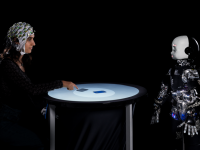People choose whether to seek or avoid information about their health, finances and personal traits based on how they think it will make them feel, how useful it is, and if it relates to things they think about often, finds a new study.
Brain
Gaze is an extremely powerful and important signal during human-human communication and interaction, conveying intentions and informing about other’s decisions. What happens when a robot and a human interact looking at each other? Researchers at IIT-Istituto Italiano di Tecnologia (Italian Institute of Technology) investigated whether a humanoid robot’s gaze influences the way people reason in a social decision-making context.
How do you study a group of organisms with over 300,000 species, dispersed across all seven continents, and with up to 50 times as much DNA content as the human genome?
This is the question posed to biologists studying the evolutionary history of flowering plants, called angiosperms, whose rapid diversification was so convoluted a problem that Darwin referred to it as the 'abominable mystery.'
The Covid-19 pandemic and the politicization of health-prevention measures such as vaccination and mask-wearing have highlighted the need for people to accept and trust science.
But trusting science isn't enough.
A new study finds that people who trust science are more likely to believe and disseminate false claims containing scientific references than people who do not trust science. Reminding people of the value of critical evaluation reduces belief in false claims, but reminding them of the value of trusting science does not.
Canada should anticipate a resurgence of a childhood respiratory virus as COVID-19 physical distancing measures are relaxed, authors warn in CMAJ (Canadian Medical Association Journal).
Toronto -- People post 500 million tweets and 4 billion pieces of content on Facebook a day. What makes them do it?
An urge to share and connect with others seems obvious. But, despite how toxic the social media sandbox can get, people more often share attitudes that are framed in terms of support instead of opposition, according to new research. That happens regardless of whether the opinion itself is positive or negative.
Advanced technologies have been used to solve a long-standing mystery about why some people develop serious illness when they are infected with the malaria parasite, while others carry the infection asymptomatically.
Due to the global efforts to meet sustainability standards, many countries are currently looking to replace concrete with wood in buildings. France, for example, will require that all new public buildings will be made from at least 50 percent wood or other sustainable materials starting in 2022.
Drought can have a lasting impact on the community of microbes that live in and around roots of rice plants, a team led by UC Davis researchers has found. Root-associated microbes help plants take up nutrients from the soil, so the finding could help in understanding how rice responds to dry spells and how it can be made more resilient to drought. The work is published July 22 in Nature Plants.
In the depths of space, there are celestial bodies where extreme conditions prevail: Rapidly rotating neutron stars generate super-strong magnetic fields. And black holes, with their enormous gravitational pull, can cause huge, energetic jets of matter to shoot out into space.
Millennials, often referred to as the "job-hopping generation," represent a group of young workers who once grabbed the national spotlight with their publicized demands for "fun" work perks, such as happy hours. However, researchers at the Novak Leadership Institute at the University of Missouri and Kansas State University discovered today's young workers -- ages 21-34 -- represent a life-stage shift toward placing more value on having respectful communication in the workplace over trendy work perks.
Irvine, Calif., July 21, 2021 -- It's not exactly X-ray vision, but it's close. In research published in the journal Optica, University of California, Irvine researchers describe a new type of camera technology that, when aimed at an object, can rapidly retrieve 3D images, displaying its chemical content down to the micrometer scale. The new tech promises to help companies inspect things like the insides of computer chips without having to pry them open -- an advancement the researchers say could accelerate the production time of such goods by more than a hundred times.
FINDINGS
Scientists from the UCLA Jonsson Comprehensive Cancer Center have identified a key protein, transcription factor TAF12, that plays a critical role in the formation of a preinitiation complex, which consists of over one hundred proteins that are necessary for the transcription of protein-coding genes. The team found by eliminating TAF12, the entire preinitiation complex is destroyed and the genome-wide transcription is downregulated drastically.
It's hard to save what you can't identify. That's been a problem for the endangered salt marsh harvest mouse, which is found only in the salty, brackish waters of the San Francisco Bay area. The mouse competes for space with about eight million humans, and more than three-quarters of its habitat has been eaten by development and land conversion. That loss is expected to increase amid rising sea levels.
Conserving the population has proven tricky, in part because it looks so much like another mouse in the area--the western harvest mouse--that is abundant throughout western U.S.
A landmark scientific study involving marine biologists from Greece, Turkey, Cyprus, Libya, Italy, Tunisia, the UK, the US and even Malta, documenting instances where native Mediterranean species have preyed upon two highly invasive marine fish - the Pacific red lionfish and the silver-cheeked toadfish - has just been published. Prof. Alan Deidun, coordinator of the Spot the Alien Fish citizen science campaign and resident academic within the Department of Geosciences of the Faculty of Science, is a co-author of such an extensive study.

